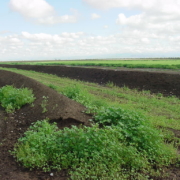Global Nutrient Analysis Shows Recycling Feces and Urine Would Reduce Need for Mined Fertilizers
Scientists from Cornell University published results of their global analysis of nutrient recycling in Nature Sustainability. They concluded that many countries could become self-sufficient for fertilizer if they would recycle all human and animal urine and feces to agriculture. The nutrients found globally in human and poorly utilized livestock excreta represent 13% of crop and grassland needs for major nutrients, according to this analysis. Capturing these underutilized nutrients and utilizing them effectively would reduce need for imported fertilizer in many countries and could also help prevent water pollution. “It doesn’t make any sense to pollute our environment, especially our waters and soils, and then have not enough fertilizer for agriculture,” senior author Johannes Lehmann said. “We need to close the loop from poorly utilized nutrients, wherever they come from, and in this paper, we show that taking only two of these feedstock types, animal excreta and human excreta, we could theoretically satisfy all our fertilizer use at present.”

 NCAT
NCAT
